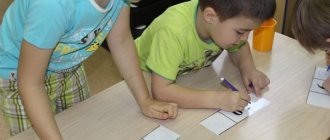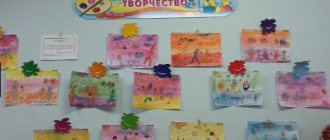All children in the world are united by a love of games.
Play is a natural need for a child, since it is in the form of play that children learn about the world, understand how it works, and consciously comprehend the experience gained.
Play is important not just as a source of joy and good mood, it develops the brain, imagination, creativity, vocabulary, social skills, the ability to learn and perceive more complex information.
How do 6-7 year old children develop?
At this age, the baby’s thinking abilities enter a new, better stage of development.
By age 6, most children:
- master reading, writing, counting to 20;
- understand the simplest time intervals;
- focus longer on one solution to one logical problem;
- their reasoning becomes more meaningful;
- understand information better by listening.
What games are useful at this age?
For a preschooler, different forms of games will be useful.
Psychologists recommend involving children in the following game formats:
- child-initiated play;
- play initiated by an adult;
- a traditional game when both a child and an adult can take the initiative.
From the point of view of benefits, the most significant games are those offered by adults, since in this case the child finds himself in a learning situation, gets acquainted with new words, concepts and can make this situation manageable.
As for choosing a specific game format, it all depends on the situation. For the street, outdoor games are selected that contain an element of sports. At home, you can play board games or role-playing games, or assemble a construction set.
1. Outdoor games develop coordination, strength, endurance, and reaction speed. At the age of 6-7 years, the game lasts about half an hour.
2. Board games help brighten up your leisure time when the weather is bad outside. With the help of cubes, puzzles, figures, cards, the child improves his skills - logic, spatial thinking, social interaction, speech, concentration, will.
There are a huge number of board games - walkers, puzzles, cubes, mosaics, construction sets, flashcards, strategies.
3. Educational games - in this case we are talking about the targeted development of a specific skill or ability, for example, speech, gross motor skills, intelligence, imagination.
The use of such games prepares fertile ground for the further development of the child’s creative abilities and talents. The training program is structured from simple to complex, but the conditions of each task should be slightly ahead of the child’s developmental level.
Intellectual competitions for the New Year for children
Count it
The game is suitable for those who can diligently do mathematical calculations. The task is simple - count how many days of the week there will be in the coming year. Whoever manages it first wins. The game will perfectly help you practice calculations and cope with your impatient temperament.
Who is Santa Claus?
The game is designed not so much for intelligence as for the ability to quickly think and find new facts. The children’s task is to take turns naming one fact that relates to the main hero of the New Year’s celebration. It is important not only to name a fact, but also to be able to interpret it. The game helps develop thinking and teach the child to explain his own point of view.
New Year is...
Each participant is given a piece of paper and a pencil. In one minute you will need to write a description of 5 sentences for the New Year. It is important to reflect all the nuances that relate to the holiday. The game is suitable for those who already know how to write and analyze. In the process, the child will learn to highlight the main thing against the backdrop of a lot of other information, and will also help the child formulate his own thoughts.
Quiz
If you have the time and desire to prepare a full-fledged quiz for children for the New Year, then this will be the best intellectual game for the New Year holiday. The main thing is to select questions in accordance with the age of the participant. Players will learn to search for the right answers in the flow of information, build team spirit and work as a team.
New Year cartoon
Players will be asked to reconstruct the chronological events of a previously shown cartoon excerpt. The presenter shows a short video of 1-2 minutes from a famous New Year's film, the players' task is to continue and tell what will happen next. It is important not just to remember or come up with a course of action, but to explain why the characters act this way. The game perfectly helps a child learn to think critically, build logical chains and connect different actions with each other.
Games 30. Plant
First of all, you need to make a plant - a tree, a flower - from any available materials. Then the child composes a fairy tale about him. The main thing is that in the story the child describes in detail how the plant feels - is it comfortable or is something bothering it.
Through these metaphors, an adult can understand what is bothering the child. If there is a cause for concern, ask your child what you can do to help the plant - build a fence, call a fairy, plant other trees. This way the baby will use the example of a fairy tale to cope with his anxieties.
Games 31. Face games
In children who have suffered some unpleasant events in life, a frozen mask may appear on their face and emotions disappear. You can motivate your child in several ways - invite him to play tricks, make funny faces with him, or organize a home theater.
Games 32. Simple holidays
Allow your baby to feel the holiday in your life as often as possible. Try to turn every simple event into something bright and unusual. For example, the festival of making the bed, washing, the festival of lunch. Be sure to record any of your child’s achievements, write them down or draw them - this motivates and builds confidence in yourself and your abilities.
Games 33. Color therapy
If your child often returns to unpleasant events in the past, focus his attention on the current day, for example, come up with a specific color for each day of the week and try to stick to it. For example, let Monday be blue - pick up such clothes, look for blue objects around.
Games 34. Schedule
To stabilize a child’s condition after a stressful situation, it is necessary to structure his daily routine, draw up a schedule, and decorate it. The kid must monitor its implementation. On the one hand, it teaches discipline, and on the other, it distracts from unpleasant thoughts.
Advice! Anxious children prone to stress intuitively choose outdoor games where they need to jump. This helps relieve tension and feel supported. Create an area for your child where he can jump safely and happily.
Conflict situations sometimes occur between children, and here play becomes critically important, since with its help the child relieves stress and relaxes . Of course, games should be appropriate for the child’s age and development, be diverse and useful. This is what we will talk about in our material.
Development of critical thinking in a child
Why
The game is suitable for any conditions. She will teach the child to think and analyze. You can even play it on the way to kindergarten or school. The child needs to constantly ask questions that do not contain an answer. It is important that in the process of reasoning the baby learns to analyze and look for a cause-and-effect relationship. For example, “why shouldn’t you jump into a puddle?”, “why is yelling at your parents bad?” etc.
Make up the end
The game will perfectly help your child develop not only critical thinking, but also imagination. So, you need to read a fairy tale or story with your children. At the most unpredictable moment, you need to stop and ask the child to figure out the ending of the story. After this, you can compare the endings of the child and the author, finding the pros and cons of both options.
If... then...
This entertainment is great for teaching kids how to find cause-and-effect relationships. The presenter says a few phrases that will let the participants understand the essence. For example, if it rains tomorrow, you need to take an umbrella with you, or if you miss school tomorrow, you will fall behind in several subjects. Then the presenter says only the first part of the expression, and the players continue.
Debate
Players must be divided into 2 teams. After which the presenter offers to choose one of the proposed topics or actions. One team should say the pros, and the second - the cons. The game perfectly helps you learn to compare facts, think critically, and develop a competitive spirit.
Persuasion
Which, no matter how much evidence proves the opposite, teaches a child to insist on his own and find irrefutable evidence. So, in this game, you will have to tell the child, for example, that it only seems to him that the grass is green. It's actually purple. The child, naturally, will not agree and will try to explain to you why the grass is green.
Where to find time to play with your child
This question is asked by many parents, since modern moms and dads are busy people who have a lot of household responsibilities, work, of course, and a natural desire to take time for themselves and relax. Due to the fact that there is not enough time to spend with the baby, parents often worry and worry. Psychologists assure that you can find time to communicate with your child if you follow simple tips.
Tip 1 – play with your child and mind your own business at the same time.
Games that do not require special training or additional items can be played in the kitchen, bathroom, or on the street. If you don’t feel like playing, involve your child in homework, do something together, for example, make pizza, or just let your child help you.
The main thing is to talk to the child more, explain, praise and support.
Tip 2 – use any free minute.
Transport, queues, the road to somewhere - this time can be used profitably. Tell your child about natural phenomena, make riddles, compose fairy tales, play counting and words.
Tip 3 – games and activities should become a habit.
Of course, we are not talking about classes for an hour or two. Make it a rule to work with your child every day for 15-20 minutes; this will be quite enough for a child aged 6-7 years. For example, read a book to your child before bed.
Tip 4 – try to create a nurturing environment at home.
Use posters, manuals, cards, magnetic games. The more educational objects there are around a child, the faster he will remember information. Please note that developmental aids should be bright and colorful.
Tip 5 – find company for your child.
If this is the case and you cannot play with your baby, try to find children for him with whom he can spend his time.
Gaming memory development
What's missing?
You need to lay out several images on the table. The child looks at them, and the presenter tells a story about each image, after which the player turns away. During this time, the presenter must remove one photo. After which the child must not only understand which image has disappeared, but also tell what it meant.
I'll name everything
The guys sit in a circle. Together they choose a common topic. After which the first participant says a word. The second player must say the first word of the first participant and his new one. So each child must supplement the chain of words with his own. The main thing is not to lose your way.
Route
The player is blindfolded. The leader leads him along the intended route, telling him how many steps and where to go. At the end of the route, the participant is untied and turned around. His task is to do all the steps exactly the opposite and find the “start” point.
Toy queue
The presenter lines up 5-6 toys one after another, explaining who is behind whom. After which the presenter says that the toys needed to go to their owners, and when they returned, they could not restore the line one after another. We need to help them and line them up correctly one after another.
What's on the tray?
The presenter puts 5-10 small things on the tray. For one minute, the participant looks at the tray and remembers what is on it. After this, the presenter covers it with a towel or other rag, and the participant’s task is to remember all the things that are on it.
Intelligence of a child aged 6-7 years
At this age, children have already formed personalities and have their own views on the world around them and what is happening in it. The child understands his position both in the children's team and among adults, and accordingly builds a line of behavior and forms a certain attitude towards the people who surround him.
The level of emotional development in children 6-7 years old is also quite high. They show sympathy , empathize, feel the mood of other people, and offer help.
- We are talking about children who are almost first graders, they can control their mood, follow the instructions and requests of adults, and take part in group and individual activities.
Advice! Since children 6-7 years old easily navigate circumstances, parents can give their child the basics of personal safety and teach them to find a way out of difficult situations.
2. At 6-7 years old, children show an active interest in new knowledge, since at this age the memory capacity increases, the child’s attention becomes more concentrated, and the vocabulary expands (up to 6 thousand words).
3. Parents need to continue classes on the development of children’s speech, familiarize children with the structure of language, in addition, develop fine motor skills, logic, and the ability to systematize objects by characteristics.
Attention competitions for children
My color
Each player receives a pre-prepared card. All cards must be different colors. At the command of the leader, the children must line up in a minute from the lightest to the darkest card. The game perfectly trains children's attentiveness and concentration on details.
Animal Partner
An even number of players is required. In advance, the presenter prepares paired cards with images of animals. Participants get to know their animal. After this the light turns off. Players must find their match based on the sounds made. You can't speak human language. You just need to make sounds characteristic of those made by the animal shown in the picture.
Details in a circle
Children sit in a circle. The first participant names any large word, for example, house or city. The neighbor on the right must name a clarifying detail, for example, a house with windows or a city with a park. Each time, the neighbor on the right must name an increasingly smaller clarifying detail. The game perfectly develops logic and attention to detail.
Do it the other way around
The game is suitable for those who already know how to write. The presenter defines 2 commands, for example, “word” and “line”. When the presenter says “word”, you need to draw a line, and when he says “line”, you need to write a table. It is important to concentrate and not get confused in tasks. And to simplify the task for the presenter, we recommend that he give a hint in the form of “LLLSLSLSLSLLLSLL”.
Unravel us
A leader is chosen for the game. The rest of the participants join hands. The presenter will have to leave the room. The rest begin to walk in different directions, thereby becoming confused. The main thing is not to let go of each other’s hands. The task of the presenter, when he returns, is to unravel the “confusion” of his friends. The game trains memory, attentiveness, logic and thinking in children.





